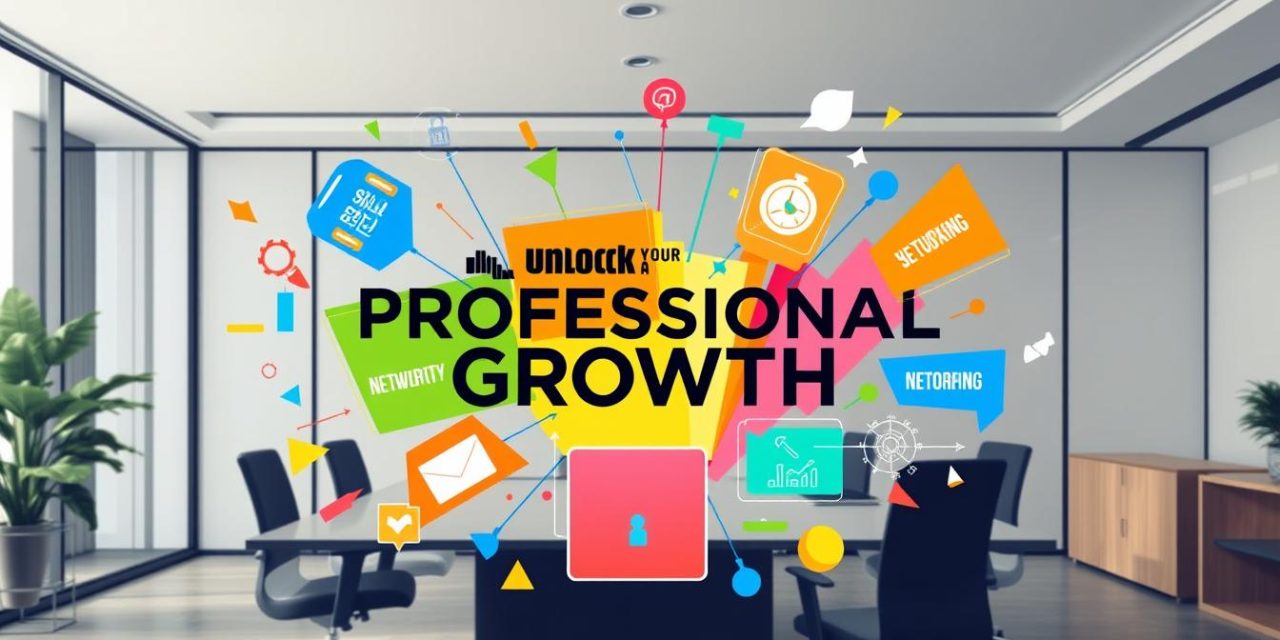Welcome! Are you ready to take charge of your career path? This guide is your first step toward meaningful development. We will explore how intentional effort can transform your work life.
Career advancement is about more than just a title. It involves building a strong set of skills and making smart adjustments. This process helps you clarify your ambitions and pursue them with confidence.
A clear plan for your development leads to exciting outcomes. You can gain new abilities, earn promotions, and find deeper satisfaction in your work. Let’s begin this journey toward continuous learning and achievement.
Table of Contents
Key Takeaways
- Professional growth involves improving your skills and qualities to advance your career.
- Creating a clear plan is essential for focused development.
- This process helps you define and pursue your career goals more effectively.
- Tangible benefits include learning new skills and achieving promotions.
- True growth is about continuous learning and finding fulfillment in your work.
- This guide provides practical strategies to take control of your career journey.
Introduction to Professional Growth
Have you ever considered what truly drives meaningful progress in your career journey? This section explores the core concepts that shape successful advancement.
What Professional Growth Means
Professional growth represents your entire journey toward career advancement and personal fulfillment. It goes beyond daily job tasks.
This evolution involves accumulating experience and adapting to workplace changes. You step into roles that challenge and expand your capabilities.
True advancement isn’t just about climbing corporate ladders. It’s about continuous learning and gaining diverse experiences.
The Importance of Long-Term Career Success
Focusing on long-term career success brings significant benefits. You experience increased job satisfaction and better advancement opportunities.
This development helps employees become more valuable contributors. They build confidence and competence that lead to genuine accomplishment.
Stronger professional networks open doors for mentorship and collaboration. New career opportunities become accessible through these connections.
Investing in your career development is truly an investment in your future. The benefits extend far beyond your current position.
Understanding Professional Growth vs. Professional Development
When planning your career path, it’s crucial to recognize that growth and development serve different purposes in your journey. Many people use these terms interchangeably, but they represent distinct approaches to career advancement.

Key Differences and Overlap
Professional development focuses on specific skill-building for your current role. This includes training programs, certifications, and workshops that improve job performance. These goals are often personal and flexible, changing as your interests evolve.
Professional growth, however, is a broader strategic pursuit. It encompasses your entire career expansion, including experience accumulation and stepping into higher-level positions. This represents your long-term trajectory.
Here’s a clear comparison:
| Aspect | Professional Development | Professional Growth |
|---|---|---|
| Focus | Specific skills for current job | Overall career expansion |
| Timeframe | Short to medium term | Long-term journey |
| Approach | Structured training | Strategic evolution |
| Flexibility | Goals may change | Consistent direction |
Adapting to Change in a Rapidly Evolving Job Market
Today’s job market changes quickly. The idea of starting a career in your 20s and retiring from the same company is rare. Technologies advance across every field, requiring constant learning.
Success now depends on adaptability. You need to be assertive in your goals while open to improvement. Roles like Financial Managers will continue, but required skills will transform.
The best way to thrive? Embrace both development and growth as complementary strategies for long-term success in your industry.
Setting Clear Career Goals for Professional Growth
The difference between wandering aimlessly and moving purposefully toward career success often comes down to one thing: well-defined goals. Clear objectives provide direction and motivation for your journey.
Creating Specific and Measurable Objectives
Effective goals follow the SMART framework. This means they are Specific, Measurable, Achievable, Relevant, and Time-bound. This approach turns vague wishes into concrete targets.

Think of goals as internal deadlines. When you set a clear target, your mind automatically plans ways to achieve it. This mental strategy creates accountability.
| Effective Goals | Ineffective Goals |
|---|---|
| Earn certification in 6 months | Get better at my job |
| Learn Python basics in 3 months | Become tech-savvy |
| Lead a project team by year-end | Be more of a leader |
« A goal is a dream with a deadline. »
Aligning Short-Term Wins with Long-Term Visions
Short-term achievements build momentum toward bigger goals. Each small win boosts confidence and motivation. This creates a powerful cycle of progress.
Break large objectives into manageable steps. Celebrate milestones along the way. This approach makes even ambitious targets feel attainable over time.
Crafting Your Personal Professional Growth Plan
Ready to turn your career ambitions into a concrete roadmap? A personalized plan is your most powerful tool for making consistent progress. It transforms big dreams into manageable steps you can tackle with confidence.
Assessing Your Current Skills and Gaps
Before you map your route, you need to know your starting point. Honest self-reflection is the first crucial step. Look at your existing skills and identify where you need improvement.
Gather feedback from managers, peers, and past performance reviews. This helps you see yourself clearly. Pinpoint the specific gaps in your skill set that are holding you back.
- Review feedback from various sources.
- Identify your strongest abilities.
- List areas that need development.

This assessment gives you a clear target. You’ll know exactly which skills to focus on first.
Designing an Actionable Timeline for Success
Now, build your action plan with a realistic timeline. Start with small, easy-to-achieve goals. Quick wins build motivation and provide practical insight.
Break large objectives into weekly or monthly milestones. For example, a plan to earn a master’s degree involves steps like researching programs and meeting application deadlines.
Your plan is a living document. Schedule monthly check-ins to track your progress. Adjust your strategy based on results to ensure you stay on course toward your ultimate goals.
Embracing New Challenges and Opportunities
The human mind is naturally drawn to challenges, a trait you can harness for career acceleration. When your work starts to feel like a « same ol’ routine, » it’s a sign to seek fresh experiences. Stepping outside your comfort zone is a powerful way to analyze your potential and test your limits.

Stepping Out of Your Comfort Zone
New responsibilities can completely refresh your view of your current role. Volunteer for a complex, high-impact project that stretches your skills. This exposes you to valuable learning and shows your commitment.
Look for opportunities beyond your full-time job. Start a blog, open an Etsy shop, or record a podcast. These side ventures are excellent examples of hands-on meaningful career development.
Each new challenge is a chance to expand your responsibilities. Tackling unfamiliar tasks helps you develop new competencies. This proactive approach demonstrates your drive for continuous improvement.
Mentorship and Networking for Career Advancement
The right connections can dramatically accelerate your career path. Building strong relationships provides guidance, opens doors, and offers support you can’t find elsewhere.
This process is about more than just collecting contacts. It’s about creating meaningful exchanges that benefit everyone involved.
Finding and Engaging with Mentors
As Robert Boyce said,
« Knowledge is power. Knowledge shared is power multiplied. »
A mentor shares their experience to help you avoid common pitfalls. This person doesn’t need to be a senior executive. It could be a skilled colleague or an industry expert you admire.
The key benefit is receiving honest feedback. This outside perspective highlights skills you need to improve. It keeps your efforts focused and effective.
Look for formal programs in your workplace. You can also reach out directly to someone you respect. Be clear about what you hope to learn from the relationship.
Building a Robust Professional Network
A strong network exposes you to new ideas and opportunities. It’s a vital resource for continuous learning and advance your career skills.
Start by attending industry events or joining online groups. Platforms like LinkedIn are excellent for connecting with peers.
Focus on building genuine relationships, not just contacts. Offer your help to others when you can. Strong communication is the foundation of every valuable connection.
This effort strengthens your profile and keeps you informed. It’s an investment that pays off throughout your entire career.
Developing New Skills and Embracing Continuous Learning
Mastering new competencies has become the cornerstone of maintaining relevance in an increasingly competitive job market. Continuous learning keeps your abilities sharp and opens doors to exciting opportunities.
Leveraging Courses, Certifications, and Training
Online platforms like Coursera and Udemy offer thousands of courses across various disciplines. These programs provide valuable certifications that enhance your resume and credentials.
High-demand skills worth exploring include GenAI, data analysis, and UX design. Developing these abilities can significantly boost your earning potential.
| Learning Method | Time Commitment | Certification Value | Skill Level |
|---|---|---|---|
| Online Courses | Flexible | High | Beginner to Advanced |
| In-Person Training | Fixed Schedule | Very High | Intermediate to Expert |
| University Programs | Long-term | Highest | All Levels |
| Workshops | Short-term | Moderate | Beginner to Intermediate |
According to recent data, 54% of employees consider continuous training essential for their professional development. This shows how important ongoing education has become.
Effective time management is crucial when balancing learning with work. Set aside specific hours each week for skill development. Track your progress to stay motivated.
Remember that learning continues after acquiring new skills. Teaching others solidifies your understanding. Many organizations require ongoing training to maintain certifications.
Proven Strategies for Professional Growth
In today’s dynamic work environment, having a toolkit of proven approaches is essential for advancement. These methods help employees navigate changing demands while building valuable skills.
Harnessing Feedback and Self-Reflection
Regular feedback from supervisors and colleagues provides crucial insights. This practice helps identify both strengths and areas needing improvement.
Set aside dedicated time each month for honest self-reflection. Assess how your actions align with career goals. This combination of external input and internal assessment creates powerful growth.
Adapting to Emerging Trends and Technologies
Staying current with industry trends ensures long-term relevance. Technologies like AI and automation are transforming many fields.
Develop skills in areas like data analysis and machine learning. Embrace new project management tools that boost productivity. Software expertise keeps teams competitive.
Remote work arrangements demand strong communication and time management. These soft skills are increasingly valuable across all industries.
Conclusion
Your journey toward career success is uniquely yours. The strategies we’ve discussed provide a powerful roadmap for your development.
Opportunities to advance your career skills are everywhere. You can find them in new projects, leadership roles, and continuous learning. Embracing change and seeking feedback are key steps.
Remember, investing in your development is an investment in your future. It leads to greater job satisfaction and opens new doors. A great way to start is to explore specific programs that fit your goals.
Take that first step today. Your commitment to learning and adapting will drive your long-term success and fulfillment.
FAQ
What is the main difference between professional growth and development?
Think of development as the building blocks—like taking a course or earning a certification. Growth is the bigger picture: how those blocks build your entire career path, leadership abilities, and long-term success. They work together, but growth is about your overall journey.
How can I create a solid plan for my career advancement?
Start by looking at your current role and skills. Identify what you need to learn next. Then, set clear, measurable goals and break them into steps. Tools like Trello or a simple spreadsheet can help you track your progress and stay on schedule.
Why is stepping out of my comfort zone important for my career?
Trying new things, like leading a project or learning new software, pushes your abilities. It builds confidence and shows your company you’re adaptable. This often leads to new opportunities and keeps your skills fresh in a changing job market.
How does networking actually help with career advancement?
Building connections opens doors to opportunities you might not find otherwise. A strong network provides support, advice, and can lead to mentorship. Platforms like LinkedIn make it easier to stay in touch with industry contacts and learn from their experiences.
What are some effective ways to learn new skills for my job?
There are many paths! You can take online courses on Coursera, pursue certifications relevant to your field, or attend workshops. Also, don’t underestimate learning on the job—ask for feedback and volunteer for tasks that stretch your current abilities.
How can I stay updated with trends in my industry?
Make it a habit to read industry blogs, follow thought leaders on social media, and listen to podcasts. Joining professional organizations or attending webinars are also great ways to keep your knowledge current and maintain a competitive edge.





